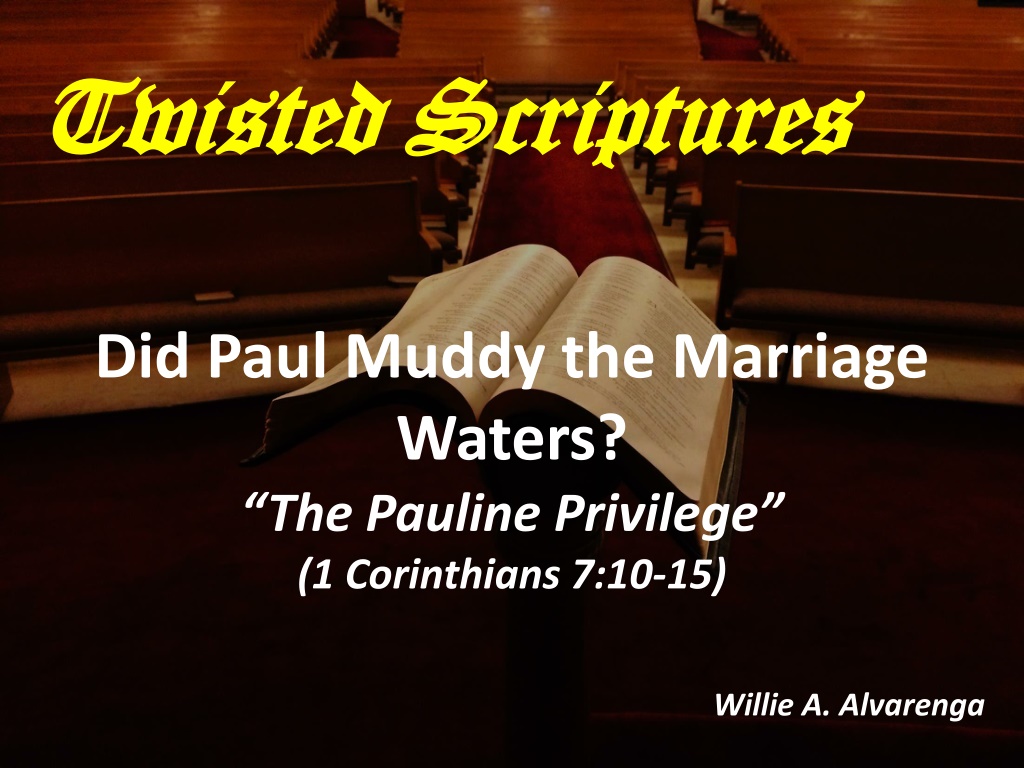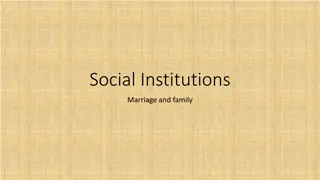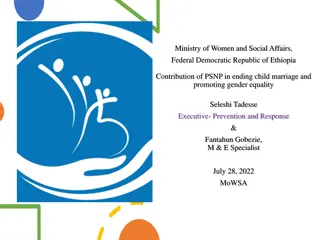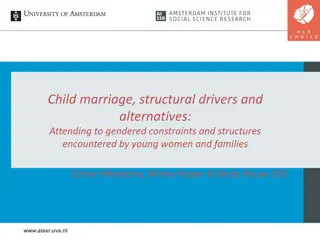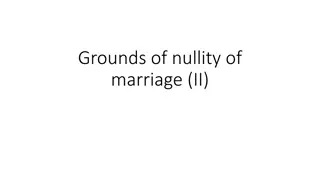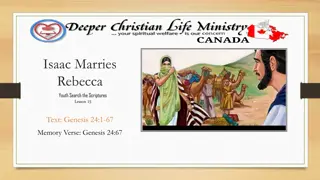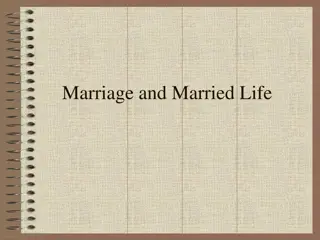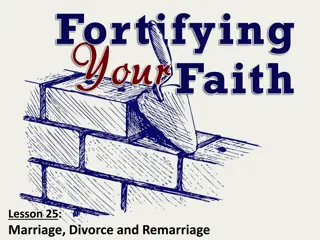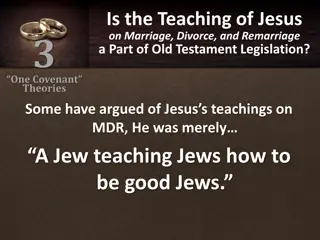Understanding God's Design for Marriage and Remarriage
Exploration of the teachings on marriage, divorce, and remarriage as outlined in the Scriptures, emphasizing the importance of following God's design and principles. Delve into the context of 1 Corinthians 7 and the Pauline Privilege to gain clarity on the biblical perspective regarding marriage bonds.
Uploaded on Nov 15, 2024 | 0 Views
Download Presentation

Please find below an Image/Link to download the presentation.
The content on the website is provided AS IS for your information and personal use only. It may not be sold, licensed, or shared on other websites without obtaining consent from the author. Download presentation by click this link. If you encounter any issues during the download, it is possible that the publisher has removed the file from their server.
E N D
Presentation Transcript
Twisted Scriptures Twisted Scriptures Did Paul Muddy the Marriage Waters? The Pauline Privilege (1 Corinthians 7:10-15) Willie A. Alvarenga
Wrestling the Scriptures was a reality in the past and continues to be the case today! : to distort the meaning of something in communicating to others to misinterpret, to change the meaning of, to explain falsely. (2 Peter 3:16; 1 Timothy 4:1).
My Responsibility as a gospel preacher Be faithful to the doctrine of Christ (1 Peter 4:11; 2 Timothy 4:1-4; Titus 2:1; 2 Timothy 1:13; 1 Timothy 4:16).
Your Responsibility as a Listener Search the Scriptures (Acts 17:11; 1 Thessalonians 5:21; 1 John 4:1).
Panoramic View of Our Panoramic View of Our Lesson Lesson A brief summary of the teaching of marriage, divorce and remarriage as taught by our Lord. A summary of the so called, Pauline Privilege A brief refutation of the twisted view of the, Pauline Privilege The real meaning of the phrase, Not under bondage.
A Brief Overview of the Context of 1 Corinthians 7 Paul answers a few questions regarding marriage which the Corinthian brethren had asked him about (7:1). He also deals with some instructions about marriage. Paul provides several principles relating to a marriage of Christians to Christians (10-11). Instructions to a marriage of Christians to non- Christians (12-15). Paul also provides instructions for those who are not married, as well as to those who have lost their spouse (1, 8, 32-35; 39-40).
A BRIEF SUMMARY OF GOD S TEACHING ON MARRIAGE, DIVORCE AND REMARRIAGE
According to a correct exegesis of the New Testament, the only ones who are authorized to marry or remarry with God s approval are # 1. Those who have never been married before and who will marry someone who is eligible for marriage (Genesis 2:24; Matthew 19:1-6). # 2. Those who have gone through a divorce due to fornication being the only cause. In such cases, only the innocent spouse can marry again (Matthew 19:9). This is not the case for the guilty party. # 3. Those who have lost their husband or wife due to death are able to enter into another marriage with God s approval (Romans 7).
A HISTORY AND SUMMARY OF THE SO CALLED PAULINE PRIVILEGE
What do people mean by the so called Pauline Privilege ? In essence, it is an erroneous interpretation of 1 Corinthians 7:15 where some teach that the apostle Paul provided another cause by which people can divorce and remarry with God s approval, that is, another cause besides the only one the Lord provided in Matthew 19:9.
What do people mean by the so called Pauline Privilege ? The Pauline Privilege also advocates the false doctrine that the teachings of the Bible on marriage, divorce and remarriage only apply to Christians, and not to non- Christians. What Jesus taught on Matthew 19:1-9, only applies to Christians, since it is a covenant passage (they say).
What do people mean by the so called Pauline Privilege ? The Pauline Privilege teaches that a non- Christian who divorces his spouse can divorce and remarry as many times as he wishes, and such with God s approval. They argue that the Christian cannot get a divorce, and if it does, then such Christian must remain unmarried, but the non-Christian can do it without any problems whatsoever.
This doctrine was first advocated by John Chrysostom, an archbishop of Constantinople around 347-407 A.D. He was known as the Doctor of the Church (i.e., the Catholic Church). This doctrine is also part of the Roman Catholic Cannon law. The Pauline Privilege was also defended by the Reformer, Martin Luther. This doctrine has been taught by several preachers such as James D. Bales, Neil Lightfoot, James Burton Coffman, and others.
A BRIEF REFUTATION OF THE PAULINE PRIVILEGE This doctrine is false for the following reasons:
# 1. It stands contrary to the doctrine of Marriage, Divorce and Remarriage as taught by our Lord in Matthew 5:32 & 19:1-9, cf. Genesis 2. The doctrine of the Pauline Privilege teaches that there is another ground or cause for divorce, besides fornication. This second cause is called, The desertion of the unbeliever or the Pauline Privilege. Jesus used the word, except which makes it clear that there is only one cause for a divorce to be acceptable by God. This cause is fornication (Matthew 19:9). Jesus used the word except in John 3:5 to refer to the only way to enter into the kingdom. If it is the case that the word except does not mean what it means, then it is the case that there is another way to enter into the kingdom of God. Such conclusion stands contrary to the Word of God. This erroneous conclusion is held by the denominational world!
# 2. The Pauline Privilege stands contrary to the word whoever used by Jesus Christ in Matthew 19:9. The Pauline Privilege doctrine teaches that Matthew 19:9 is a covenant passage , that is, it only applies to Christians who have obeyed the gospel. The laws of Christ on MDR ALSO APPLY to non- Christians. This is proven by the teaching of Matthew 14 and Mark 6, where John the Baptizer applied such laws to Herod ( It is not lawful for you to have your brother s wife, cf. Matthew 14:4; Mark 6:18). The Word applies to all (John 12:48)
If it is the case that the laws of Christ on MDR do not apply to non-Christians, then it is the case that such people are free to do whatever they want in the context of marriage. They can marry and divorce as many times as they want to without being in conflict with God s teaching. After all, the teachings of MDR do not apply to them. This, brethren, is absurd! The teaching of 1 Corinthians 7:10-15 is in perfect harmony with the universal teaching of Jesus on MDR!!
# 3. The Pauline Privilege doctrine attacks the inspiration of the Bible by implying that Paul contradicted himself in 1 Corinthians 7:10-15. In verses 10 & 11, Paul used the Greek word Chor zo for depart In verse 15, Paul used the same Greek word Chor zo for depart Nevertheless, the Pauline Privilege doctrine teaches that Paul forbids remarriage on vs. 10- 11, but authorizes remarriage on v. 15.
# 4. The Pauline Privilege is refuted by the Greek words used in the context of 1 Corinthians 7. The study of the Greek New Testament can help us to refute the error that is presented from time to time. In 1 Corinthians 7:15, Paul uses the phrase, Not under bondage. Some have suggested that the verb bondage refers to the marriage bond between a man and a woman.
This suggestion is based on the usage of the word bond in 1 Corinthians 7:27; 7:39; Romans 7:2). The word bond appears in these three passages and is used to refer to the marriage bond. The Greek verb here is dedesai for 1 Cor. 7:27 (bond); dedetai for 1 Cor. 7:39 (bond) and dedetai for Rom. 7:2 (bond). However, in 1 Corinthians 7:15, the Greek verb for bondage is dedo lotai, which does not mean the marriage bond, that is, as it is used in the New Testament (cf. Acts 7:6; Romans 6:18, 22; 1 Corinthians 9:19; Galatians 4:3; Titus 2:3; 2 Peter 2:19).
The verb bondage in 1 Corinthians 7:15 means slavery, the lowest term in the scale of servitude (Roy Deaver). Lexicographers, Louw & Nida show this word to mean: To be firmly bound by an obligation, to be bound, to be under obligation, to enslave.
# 5. The Pauline Privilege is refuted by the Greek tense of the verb bondage If it is the case that the word bondage refers to marriage bond, then we have a problem with the tense of such word. The verb bondage is found in the perfect tense, which denotes a present state resulting from past action, and its force here is was not bound and is not bound.
Wayne Jackson makes the following comment with regards to this point, The sense of the verse then is: Yet if (assuming such should occur) the unbeliever separates himself, let him separate himself: the brother or sister was not (before the departure) and is not (now that the departure has occurred) enslaved Whatever the bondage is, therefore, the Christian was not in it, even before the alien left. But the saint was married (and is) to him; hence, the bondage is not the marriage! He also went on to say, Let the reader substitute the word marriage for bondage, giving the full force of the perfect tense (i.e., has not been married and is not married ) and the fallacy of viewing the bondage as marriage will be readily apparent.
Implication if the Pauline Privilege were to be true: If there is a Pauline privilege for Christians married to non-Christians, it does not apply in marriages where both parties are Christians. In view of this fact we would be forced to conclude it is far better for a Christian to marry a non-believer because there is another possible reason for a latter marriage! Such a view is unthinkable for a Christian, but it is the logical consequence of the Pauline Privilege doctrine.
THE TRUE MEANING OF NOT UNDER BONDAGE
It simply means that the Christian is not enslaved to the non-Christian to the extent that the Christian is to forsake his faithfulness to the Lord. Roy Lanier, Sr., made the following observation, He simply means that the believer is not so bound to the unbeliever that he must give up Christ to hold the unbeliever. Harvey Floydsaid, Paul uses dedoulotai in 1 Corinthians 7:15 because he wishes to say that for a Christian to yield to pressure to give up his Christianity to preserve his marriage would mean slavery of the most abject kind. The Christian must never consider himself in such bondage. The Christian does not have to be in a situation where he or she has to choose between the Lord and his or her spouse. We are to obey God rather than men (Acts 5:29).
CONCLUSION In conclusion, you and I can reply with great confidence that the apostle Paul did not muddy the marriage waters by his teaching on first Corinthians 7. His teaching in the passage under consideration is in perfect harmony with the teaching of Jesus Christ on marriage, divorce and remarriage. Let me encourage you to do a further study of this subject in order to be prepared to teach it to others.
